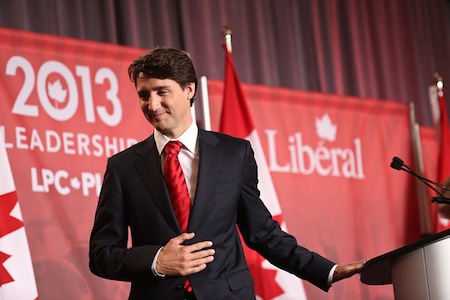
Next week, for the first time since 2002, Stephen Harper will neither be Canada’s prime minister nor opposition leader. ![]()
At the same time that Stephen Harper was on stage conceding defeat to Liberal leader Justin Trudeau, he announced (via a statement) that he would indeed be stepping down as leader of the Conservative Party, a position that he has held since 2003 when the party first came into being.
In the days ahead, the Conservative Party will decide how to appoint a caretaker interim leader pending a full leadership election to choose the party’s second leader.
Harper leaves behind a mixed legacy, like any prime minister.
For Canada’s conservatives, Harper wasn’t just a three-term prime minister, though his nine-year tenure will be longer than all but five prime ministers in Canadian history. He’s the tribune who led the Canadian right out of the wilderness of opposition and the man who brought the Canadian west back into the national conversation that had focused too long on Toronto commercial matters, constitutional crises, bilingualism and appeasing the Quebeckers.
In retrospect, it’s amazing that it took just three years for Harper to take power after engineering the December 2003 merger between his Canadian Alliance, the upstart prairie and western movement that brought a more full-throated, US-style, socially conservative attitude to national politics, and the more troubled Progressive Conservative Party. By the 2000s, the PCs were a relic of the eastern elite, and the party never fully recovered from the 1993 election, when it lost all but two seats in the House of Commons.
Incredibly, as the Conservative Party looks to choose Harper’s successor in the weeks and months ahead, he is the only leader that the current Conservative Party has known — not counting, of course, the two living former Tory prime ministers Joe Clark and Brian Mulroney, neither of whom ever completely warmed to the Calgarian warrior from the west.
*****
RELATED: Live-blogging Canada’s election results
*****
At just 56 years old, Harper certainly didn’t look or act like a leader (or prime minister) in a hurry for retirement. He looked mostly like someone who believed, until too late, that leftist and moderate voters would split between the Liberals and the New Democratic Party (NDP), giving the Conservatives yet another path to government by plurality vote. To his misfortune (and to the NDP’s), that didn’t happen.
Post-election reports reveal that Harper was considering a pledge not to seek a fifth term after 2015. But having only won his first majority government in 2011, Harper might have easily stuck around to run for a fifth mandate if he’d survived October 19. But in shooting for a fourth consecutive term, Harper knew well that he was facing long odds attempting to repeat what only Conservative John Macdonald and Liberal Wilfrid Laurier accomplished before.
Coupled with the onset of a mild economic recession, it was always an uphill fight for Harper. He can walk away from the election result with his head held high, having remade Canadian conservatism and nudged Canada toward greater fiscal responsibility, more enthusiasm for free trade and presided over a generally more unified Canadian entity. Continue reading Harper’s legacy is the birth of a modern 21st century Canadian conservatism
